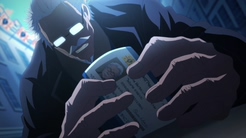I will likely be spending most of this post talking about one segment of this episode as just as the title suggests, these are a series of stories involving different countries. But before I get into that I must truly question why these particular stories were chosen. I have stated before that I love Kino for it’s introspective parables and how they make you think but today’s episode was mainly comedy for some reason. None of the stories are put together with any kind of cohesion and some I question the point of animating at all. For example, at one point this episode went from a serious dark story to complete slapstick at the drop of a hat as a story about a cooking country was introduced. A country gets Kino to cook something for them and it is revealed that Kino is a terrible cook whose meals are nearly fatal. My how hilarious, the cute girl who has confidence in cooking but all her cooking is lethal. That’s a joke so unique that I have only seen it a couple of hundred times. I mean i just finished playing through the third game in the Blazblue series(Story is still god awful but I made i this far for the gameplay) and that has this very same joke.
Why was this deemed animation worthy? It’s a story setup for a single joke that’s already been done to death, not to mention it doesn’t make much sense that Kino can’t cook. She can survive on her own and has fed others before, it’s makes no sense that she can’t cook The beginning segment is also equally pointless as it just sets up that Kino’s master has traumatised bandits enough to be very selective of who they attack. There are so many other stories that could make the cut, why this? For example, I know a short Kino story where she journeys to a land that is burning all the toys, magazines and playthings of the children on the grounds that without they will grow into pure and good adults. But whent hey let the kids ask Kino a question, one of the children asks her how to burn alive all the adults of the country. That’s the story, short but undeniable Kino. The moral may be a bit too blatant but I much prefer this to having a story about Ti hanging a wish on a statue.(Again, why choose to animate this?) The story about Kino visiting a country that she wasn’t allowed to remember is a good way of doing humor in this series as if provides a philosophical angle while entertaining a humorous one.
Not every story in Kino’s Journey is a gem which is to be expected considering it’s episodic nature but I feel there should have been far more scrutiny on choosing which stories get animated. I am fairly certain that three quarters of this episode didn’t need to be animated and could have been replaced with superior stories. There are just some odd choices going on here, such as having the author’s afterward in the credits of this episode. It gave the episode a weird finality which had me concerned whether this would only be a nine episode cour but luckily that appears to not be the case. Now onto my favorite part of the episode, a land where everything is awarded virtue points and doing good deeds gives you leeway in the country. This is a fascinating concept because the system has it’s ups and downs. Namely that it encourages people to perform good deeds but makes the act somewhat disingenuous as everyone is only after points rather than displaying genuine goodwill. But what makes this concept most interesting is that your virtue points can cancel out any wrongdoing that you commit. Under the grounds that it’s unfair for a man of many good deeds to be condemned because of one wrongdoing and a bad man being absolved due to one good deed. The man whom Kino talks to in this story had accomplished great deeds but he soon reveals that the only reason he did all of it was because he wanted to earn enough points to kill a single person.
Now I actually find the system genius for this as it appears that it takes a massive amount of points to cancel out murder and here a murderer spends his life performing good deeds for the sake of killing someone. And when he finally has what he needs, he’s old enough to see the folly of it and has no one he wishes to kill. This is absolute genius, for a evil man is made into a benefit for society and when the time comes when he can do evil, he no longer has the will to. But the big question of this story is do we judge a man by his character or do we judge him by what he has accomplished? For this man was evil but still accomplished great things worthy of respect. Does it matter if his motives for doing so where unsavory? I feel this message hits harder at the recent news of the author of Rurouni Kenshin, a well loved shounen series, was revealed to be a pedophile who had a large amount of child porngraphy. For now and forever that series will have the authors sin staining it but again the question remains. Can we respect that this man created a well loved franchise despite how rancid his character is? Do we judge a person in history by what he accomplished or by who he really was?
For there were many horrible people who accomplished great things that we benefit from even in this age. The Fate Franchise has built itself on taking the legends of people and building characters around them, characters which are likely nothing like their real life counterparts and yet to some like myself, have completely replaced their image. I wish that Alexander the great was like that of Rider from Fate/Zero but in truth he was likely a much worse person and I would not like him at all. So in truth is the form of immortality that is records is not truly a record of people, but rather of accomplishment? For what they people thought, felt and even who they truly were has been lost to the ravages of time. Cutting this off bluntly but I think this post is long enough, next episode appears to be another remake of an old story and again I feel like we could just get a new story instead of this. The kind land made for a great closing episode to the original series and having it be in the middle of the series like this is just odd.




